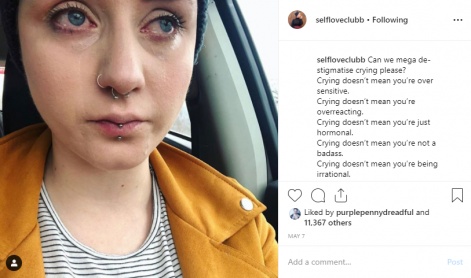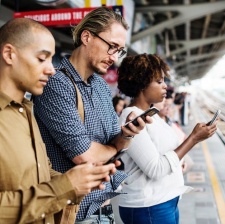Social media influencers are shaping more lives than ever before.
There are millions of daily active users across the likes of Instagram, Facebook and YouTube, and each platform is brimming with digital personalities that make us think, feel and act.
It's often argued that social media is a scourge on how we live our lives. Seeing picture-perfect photos of seemingly flawless individuals living better lives came at the price of feeling good about your existence. However, influencers are giving that power back.
More and more influencers are dedicating themselves to supporting mental health. Alongside that, they're also becoming vibrant advocates for body positivity and freedom of expression, all while shattering the illusion of 'perfection' that a lot of influencers push.
And as influencer marketing continues to flourish year-on-year, social media provides a platform to push awareness for things like mental health like nothing else.
The highlight reel
One influencer currently crushing digital expectations is Milly Smith, an Instagrammer and upcoming author. Smith, who runs Instagram account Selfloveclubb, has sculpted her online presence around health, support and self-love. She provides a safe place for people that are struggling, at the expense of her own mental health.
"Social media, especially Instagram, used to be awfully negative on my mental health," Smith tells InfluencerUpdate.biz.
"I was desperate to see real, to see the other side of the highlight reel that people aren’t willing to show. I needed to know I wasn’t the only one who went through rough times".

Instagram is a photo-driven platform so its easy to see why users become disillusioned with themselves and their lives. The majority of creators on the platform are pushing their best selves, implying that they're always on top form and never struggle.
"I wanted to see real, ‘un-Instagrammable’ times," Smith adds.
"It took me a few failed leaps of faith before I took the plunge and became that person that I wanted to see, the person that many others wanted to see too."
As Smith kept sharing her intimate posts, her fanbase grew exponentially.
I wanted to see real, ‘un-Instagrammable’ times.Milly Smith
To date, she has amassed over 176,000 followers. She's just one of countless Instagram influencers using their platform to educate, inspire and support those who are struggling with their mental health.
"My mental health is no longer something I keep in secret or with shame, it’s something I’m willing to share in hope that someone struggling may see it and simply think ‘I’m not alone'," says Smith.
"Seeing others now do the same and lead forward with their real/honest posts only spurs me on further in my journey. It’s a sense of relief to know you’re not alone, it’s a relief to release the shame and stigma."
Video killed the digital star
While Instagram is the main offender when it comes to picture-perfection, other platforms are not completely devoid of mental health problems.
Video giant YouTube is consistently under fire for encouraging burnout amongst its creators. A need to constantly create content and please the platform's finicky algorithms has taken its toll on many influencers.
But instead of shying away from their troubles, creators are actively sharing their struggles via their platforms. Some of YouTube's biggest names have openly discussed their mental health in videos.
YouTube vlogger Elle Mills documented her struggle with burnout last year in her 'Burnt out at 19' video. Mills talked about how the grind severely impacted her mental health.
"It's not what I expected," Mills explains in the video.
"I'm constantly alone, unhealthily stressed and always feel this overwhelming pressure."
Mills bravely showcases her breaking point with social media, and subsequently, her recovery into moving back into making content with the support of her friends. Her video received positive affirmation across the YouTube community and her fanbase.
Dedicates spaces
One YouTuber working to support those with mental health problems is Kati Morton, a content creator and a licensed therapist. Morton uses her platform to share her professional expertise with viewers in the hope that she can provide a space where people feel less alone with their ailments.
Speaking to InfluencerUpdate.biz last year, Morton commented on the invaluableness of YouTube as a resource.
"I just want to remind anybody out there who is struggling that reaching out for help isn't scary. Therapists are normal people too. The sooner we start talking about things the better and everybody struggles from time to time," she said.
"YouTube is also an incredible resource, and there's so much information out there. I can't tell you how many things I would have been able to understand more quickly or tell my parents if I'd have had YouTube as a teenager."
Of course, even influencers that shape their brand around mental health support are not qualified professionals and they're not an alternative to seeking medical help.
But in a world where professional support is in short supply - dedicated, accessible spaces to share and learn about mental health are needed now more than ever.













